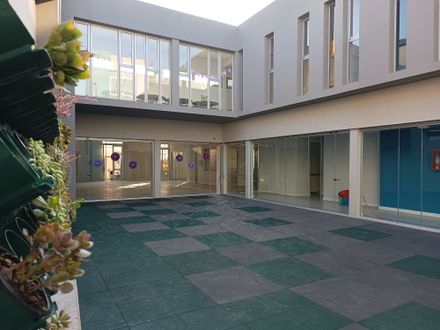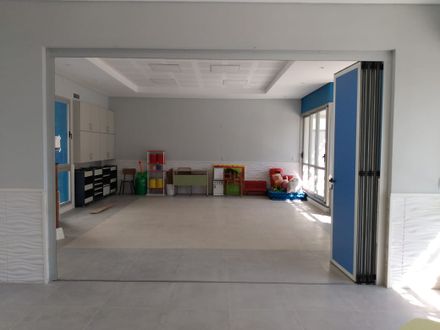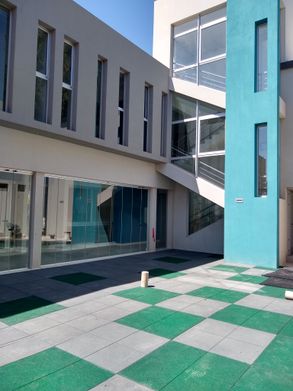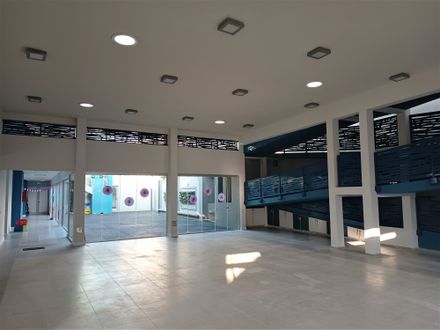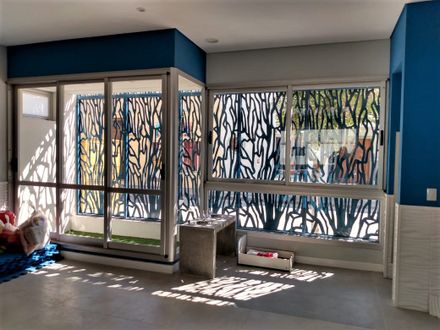Kindergarten Marista
ARCHITECTS
CGL Arquitectura
STATUS
Built
AREA
10,000 sqft - 25,000 sqft
YEAR
2022
LOCATION
Nogoyá, Argentina
TYPE
Educational › Elementary School Other
The new building of the Kindergarten Educational Unit No. 257, Colegio San Miguel, of the Hermanod Maristas, was designed by CGL Arquitectura, architects Claudia Ghiano and Gabriela Lanza, in the city of Nogoyá, Entre Ríos, Argentina.
The project was built on the corner of Moreno and Maipú, where the original Kindergarten was in operation.
At the end of this stage, school activities moved to the new building, while the stage was being built.
The premise that the construction of the new building should not interfere with the normal functioning of school activities was an important challenge that directly influenced the project, which was designed to be carried out in two stages: The first was built while classes continued in the existing building.
The work, of 1240 covered m2, consists of 250 m2 of outdoor play areas with rubber floors, and is made up of two levels, connected by stairs and ramps, with the classrooms facing north around a center garden.
The design sought to contextualize with the landscape and the scale of the surrounding urban environment.
Two different architectural styles interact on its front, since the Italianate front of the original building was restored and valued, in order to promote the institutional image and the sense of belonging, allowing each former student and teacher to continue to see reflected, go through this corner, their kindergarten.
This construction from the beginning of the 20th century interacts with the straight lines and the skin of the new building, made of perforated panels, which not only mark the aesthetics of the front, but also have the functions of parasols, visual filter, protection barrier, and security.

The intervention was carried out with the premise of the Marist pedagogical approach reflected in the project “Abrazando Infancias”: An educational space has the capacity, and the responsibility, to be an instrument to promote learning.
For this reason, each space was planned with intentionality and creativity, generating pedagogical environments that empower children as protagonists, valuing their forms of participation and interaction with them.
Light is an essential element in this project.This is present in every environment, in every corner and space.
In the classrooms and the upstairs recreational sector, sunlight projects the organic shadow of the perforated panels of the north front, allowing not only visibility, but also marking the aesthetics of these environments and allowing children to incorporate the sensation of passing weather.
The building has different learning environments whose purpose is to motivate children to create, do and undo, investigate, discover, acquire skills and learn.
The SUM is accessed through the semi-covered main entrance, which distributes to the different areas and communicates with the central courtyard, to which it opens completely through folding enclosures, which allow the circulations and the SUM to become galleries, flexible recreational spaces, without limits between interior-exterior with great fluidity and spatial continuity, communicated physically and visually.
In this project, traditional educational ideas were broken, classrooms are flexible and multisensory spaces that encourage children to investigate, learn and move freely.
These multipurpose spaces are interconnected through folding acoustic panels that join the classrooms together, the special activities room on the upper floor with the recreational sector, and the SUM with the oratory.
Thus generating flexible, integrated and adaptable spaces to different needs, allowing them to communicate or unify whenever required.
Each classroom is an independent unit, with its toilet, sinks for washing hands, storage space with mobile furniture, and small expansion terraces that provide green, air, and the possibility that they can take care of their own plants.
In this way, a functional building was created, with interconnected, multipurpose spaces that can be used on different occasions and in different ways, where children have ease of movement.
With quick access to restrooms and storage spaces. Spaces where children can play, investigate, discover and learn.



